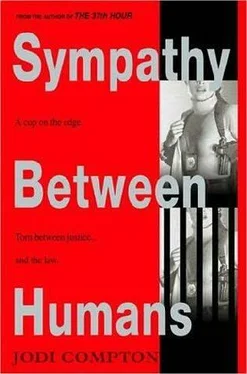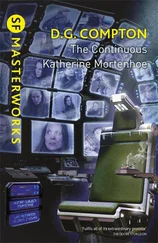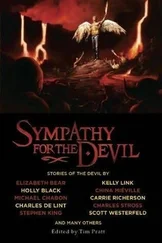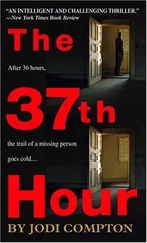The readout on my cell phone said it was 3:45. Even without a stop at a convenience store, I’d be late for work.
I backed the Nova around in a three-quarter circle and accelerated down the Hennessys’ long driveway. Someone at work would have a couple of painkillers I could score.
“Lieutenant Prewitt is looking for you,”Tyesha said, as soon as I came in.
“I’m only five minutes- oh, hell. ” I’d forgotten all about Prewitt’s request that I come in early. “Is he in his office?”
He was, but we didn’t stay there. When I entered, Prewitt rose from behind his desk. “Detective Pribek,” he said. “Come on down to the conference room.”
“Sure,” I said.
He didn’t mention that I was thirty-five minutes late for whatever this appointment was, but obviously he knew it. It was too late for me to ask for another five minutes to score some aspirin off a co-worker.
“I’m really just making introductions here,” Prewitt said, and opened the door to our conference room. As we entered, the man sitting at the long table inside got to his feet.
My surprise distracted me from the pain in my ear. It was the stranger who I’d seen twice now: first watching me on my vice detail, then with Kilander on the street corner. Up close, he had a lean, tired face, yet a fairly young one too, despite the threads of gray at his temples. I didn’t revise my estimate of his age: about 35.
“Detective Sarah Pribek,” Prewitt said, “this is Gray Diaz, from the Faribault County district attorney’s office.”
Faribault County . Blue Earth.
Diaz came out from around his chair and offered me his hand. “Detective Pribek,” he said.
“Pleased to meet you,” I said.
He let go of my hand and nodded to Prewitt. “Thanks, Will,” he said. Prewitt withdrew.
“Please, have a seat,” Diaz said.
We did. I hoped, but doubted, that I looked better than I felt.
“Are you a prosecutor?” I asked.
“I’m a DA’s investigator,” Diaz said. “I’ve been with Faribault County for about six weeks.”
“Do you like it down there?” I asked.
“Well, it’s fairly quiet,” Diaz said. “That’s why I started reading some old files.”
A little drop of sweat crawled between my shoulder blades, down toward the small of my back.
Diaz set a thick manila folder on the table before him. “This is a case that was forwarded to our office about three months ago, before I came on board. It was a joint investigation by the Sheriff’s and Fire departments,” he said.
“Royce Stewart,” I said. There was no point in waiting for him to say the name.
“Yes,” he said, and there might have been a faint note of surprise in his voice at my forthrightness. “The file definitely caught my attention. Naturally, given your familiarity with the people and events in the case, I wanted to talk to you.” He tapped a fingernail against the file. “I thought we could start by just reviewing the known facts. You can correct me if you think I’ve got anything wrong.”
Diaz opened his file and ran down Royce Stewart’s life in the dry, telegrammatic fragments of an official record.
“Royce Stewart was 25 years old at the time of his death,” he began. “Lived most of his life in Faribault County, arrests and convictions there for indecent exposure and lewd conduct; a juvenile arrest for looking in the windows of a woman’s home late at night, charges dropped. At 24, he moved to the Twin Cities, where he had a conviction for DWI, and much more significant, was arrested and charged with the rape and murder of Kamareia Brown, the daughter of Detective Genevieve Brown of the Hennepin County Sheriff’s Department. Your partner.” Diaz paused, sipping from a glass of water at his side. “The case was dismissed for technical reasons, and Stewart returned to Blue Earth.
“In October, firefighters are called out to the property on which Stewart lived. The outbuilding that he lived in is ablaze, and his body is found in it the next day.” Diaz turned a page, although I was sure the details of the case were already locked into his memory. “A little over eight hours after the fire, former MPD detective Michael Shiloh turns himself in to police in Mason City, Iowa, and confesses to Stewart’s murder. The strange thing is that Shiloh asserts he killed Stewart a week earlier, by running him down in a stolen truck on the highway outside Blue Earth.
“An investigation bears out the fact that Shiloh stole the truck, but rather than running Stewart down, he was in a one-vehicle wreck due to ice on the road. In the accident, he sustained a serious head injury that confused his memories and impaired his judgment. Fearing arrest for his ‘crime,’ he traveled south on foot, avoiding contact with other people, and finally, in Mason City, Iowa, turned himself in. His belief that he killed Stewart, according to a psychologist, was due partly to the head injury and partly to his persistent prior visualization of carrying out the crime. Michael Shiloh did not contest the charge of auto theft and is currently incarcerated in Wisconsin.” Diaz drank a little more water. “It’s quite a story.”
“You said you wanted me to point out anything incorrect in your file,” I said. “There are two things you didn’t include.”
Diaz lifted a courteous eyebrow. “Please.”
“ Shiloh didn’t fail to kill Shorty, he decided not to. Even if it was at the last minute.”
Diaz nodded, seeming to take it seriously. “And you know this how?”
“ Shiloh told me,” I said.
“I should point out that nobody can independently verify that,” Diaz said. “You’re depending on your husband’s word.”
I wasn’t. Royce Stewart had told me so. Just before he died.
“But that’s immaterial to the subject at hand, which is Stewart’s death,” Diaz said. “There wasn’t a lot of doubt in investigators’ minds that Stewart’s place was deliberately set on fire, or that he was already dead when the place burned. The file wasn’t set aside for lack of evidence that a crime had been committed. The problem was lack of evidence pointing to an identifiable suspect. As soon as I read this file, I thought my colleagues had been too hasty in dismissing the obvious person.”
I stayed quiet.
“They’d discounted a man who’d already admitted to going to Blue Earth intending to kill Royce Stewart. Who wasn’t alibied the night Royce Stewart died.”
“ Shiloh is your suspect?” I asked him.
“Your husband is definitely a person of interest,” Diaz said.
Person of interest is to suspect what tropical storm is to hurricane.
“That’s impossible,” I said. “The evidence rules him out.”
Notwithstanding that I knew for a fact Shiloh hadn’t killed Stewart, I was also familiar with all the evidence that had told investigators he couldn’t have done so. Shiloh’s injuries, the wrecked truck, the seven-day gap between his aborted attempt to kill Stewart and Stewart’s actual death… all these things supported the assertion that Shiloh had not had anything to do with Stewart’s murder.
“Are you sure?” Diaz said. “There was a nine-hour window between Stewart’s murder and Shiloh’s appearance in Mason City. That’s ample time to travel less than a hundred miles.”
“On foot?” I said.
“No, by car or truck. Just because no one has come forward to say they picked him up hitchhiking doesn’t mean no one did.”
“There may be a nine-hour window that night,” I said, “but there’s also a seven-day window between Shiloh’s try at running Royce Stewart down and the time that he showed up in Mason City. It’s hard to make a case that-” I fell silent, understanding something.
Читать дальше












